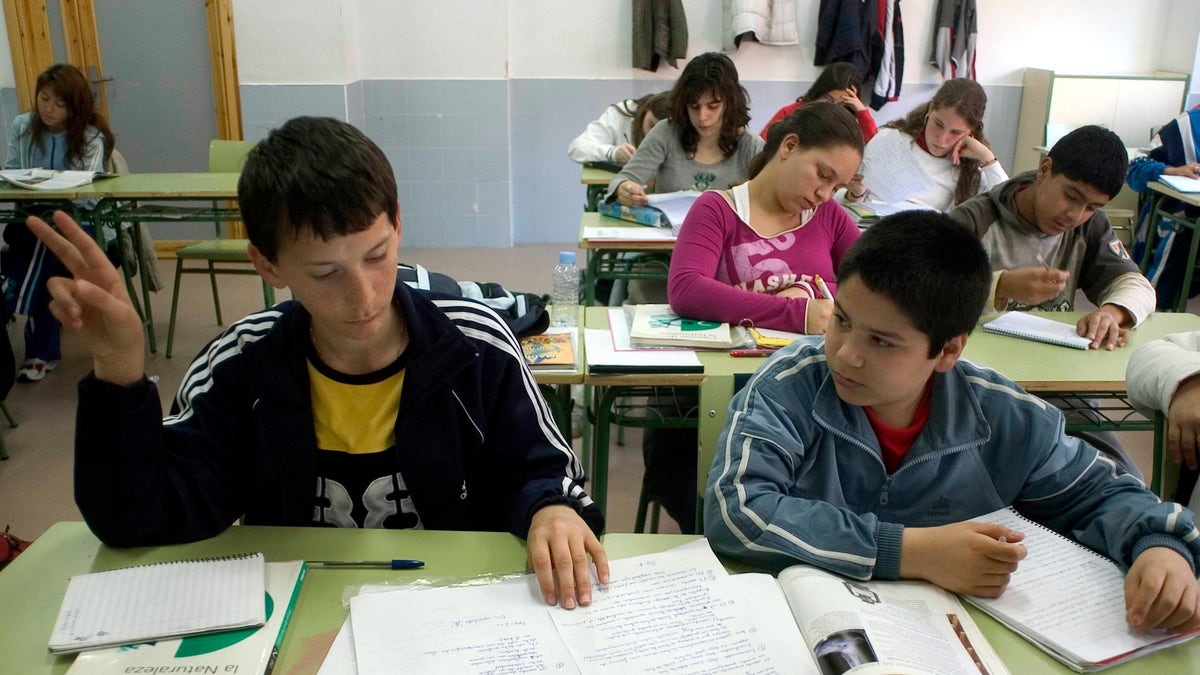
Inmigrants at school. Inmigrant children from several nacionalities in a Madrid school. (Photo by Mariana Silvia Eliano/Cover/Getty Images) (GETTY)
There is trouble brewing 50 miles northwest of Houston Texas and I’m not sure it isn’t just a whole lot to do about nothing. It happened after a middle school principal was told her services were no longer needed because she had apparently insulted the sensibilities of the area’s mostly Latino residents.
Amy Lacey was first placed on administrative leave, and then she was given the official “adios” by the Hempstead school board when it chose to not renew her contract.
Lacey is correct to mandate English among Hispanic students, because those of us who arrived in the U.S. as immigrants ... must not allow ourselves to use our native language as a crutch.
Her offense: prohibiting Spanish. The incident occurred on December 12th when Lacey took to the school’s intercom to announce that speaking Spanish anywhere on campus would be prohibited.
Her comment set off an ethnic firestorm like none the small Texas town had ever seen, with neighbor fighting neighbor and accusations of bigotry, stupidity and cultural insensitivity.
Augustin Pinedo, director of the League of United Latin American Citizens, compared the principal’s comment to racist slurs uttered against blacks during the civil rights struggle. “When you start banning aspects of ethnicity or cultural identity, it sends the message that the child is not wanted; ‘we don’t want your color. We don’t want your kind,” said Pinedo.
Yedhany Gallegos, a student at Hempstead, said she was threatened with expulsion after defending her right to speak her first language. She says when she challenged Principal Lacey she was told, “you can get out.”
Several Hispanic rights groups are even requesting that the federal government intervene, accusing the school district of terrorist activity they say is being directed toward Hispanic Americans in response to the principal’s resignation. Really? All that?
Funny how experiences can color how we see things, for just as many in the Latino community reminded by Lacey’s comments of past bad deeds, I’m reminded of a teacher who once changed my life.
My story begins in first grade with a woman named McAlvane. If she had a first name, I didn’t know it, nor would I have been allowed to use it. She was strict, old and southern. And as she saw it, there was something seriously wrong with me.
It was the 1960s and I had just arrived from Cuba with my refugee parents. Frightened, out of place and speaking not a lick of English, I was plopped into the back row of Miss McAlvane’s class. There was no ESL (English as a Second Language) back then. There were no other students to talk with who, like me, spoke only Spanish. And that made me a bit of an oddity.
“Mentally retarded.” That’s what Miss McAlvane put on my transcript. She was convinced my inability to communicate was caused by a mental deficiency and there it went. My parents were called in. Ashamed and disappointed, they cried. What else could they do? Yes, they wept and so did I.
The dreaded ‘F’ word, I had failed first grade before I’d even gotten a chance to begin. I would have to repeat the grade. I was left with but one recourse, learn English.
By the middle of my second year of first grade, I was getting all “A’s,” which I attribute to one thing — immersion. It was sink or swim. With no one with whom to speak Spanish and a strict teacher who compelled me to speak only English, I improved and eventually excelled.
I learned English well enough to become a national news anchor, proving to me that what had once seemed cruel had turned out to be a better path. At school, by force I spoke only English, while at home with my parents, I spoke only Spanish.
The Take Away
I share this personal anecdote not to give principal Lacey a pass. I can’t tell you what was in her heart when she grabbed the intercom to pronounce her prohibition of Spanish. Her intent may have been hateful or perhaps benign. No doubt she would have been better served by encouraging English, rather than discouraging Spanish, but what about her students?
I speak from experience when I say that Lacey is correct to mandate English among Hispanic students, because those of us who arrived in the U.S. as immigrants, or as a refugee in my case, know fully well that in order to learn a new language we must not allow ourselves to use our native language as a crutch.
Irrespective of her manner, by forcing her students to speak English Lacey made them better. Was it the right approach in terms of style and political correctness? Probably not, but educationally I can vouch for her. It’s A-plus.
